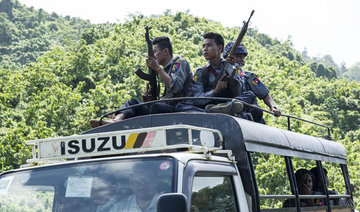UNITED NATIONS: The United Nations Security Council will meet behind closed doors on Wednesday to discuss escalating deadly violence between Rohingya insurgents and Myanmar security forces in Rakhine state.
Britain has asked for the meeting amid an upsurge in violence that triggered a fresh exodus to Bangladesh of Rohingya Muslim villagers.
“Need to address long-term issues in Rakhine, urge restraint by all parties,” Britain’s UN Ambassador Matthew Rycroft posted Tuesday on Twitter.
A series of coordinated attacks by Rohingya rebels on security forces in the north of Myanmar’s Rakhine state on Friday has Rohingya Muslims fleeing to Bangladesh.
Bangladeshi border guards, however, have been turning away the evacuees, despite an appeal by UN Secretary-General Antonio Guterres for Dhaka to allow Rohingya to seek safety.
At least 109 people have been killed in the clashes in Myanmar, according to the government, most of them militants but including members of the security forces and civilians.
The treatment of about 1.1 million Muslim Rohingya in Myanmar has become the biggest challenge for national leader Aung San Suu Kyi, who has been accused by Western critics of not speaking out on behalf of a minority who have long complained of persecution.
The Rohingya are denied citizenship in Myanmar and classified as illegal immigrants, despite claiming roots there that go back centuries.
The violence marks a dramatic escalation of a conflict that has simmered since October, when a similar, but much smaller, series of Rohingya attacks on security posts prompted a fierce military response dogged by allegations of human rights abuses.
The top UN human rights official, Zeid Ra’ad Al-Hussein, called on Myanmar on Tuesday to ensure its security forces refrained from using disproportionate force, adding that the political leadership had a duty to protect all civilians “without discrimination.”
“This turn of events is deplorable. It was predicted and could have been prevented,” he said.
Myanmar’s National Security Adviser Thaung Tun said at a news conference that Myanmar had come under attack and had the full right to defend itself. He added that “security personnel have been instructed to make sure that innocent civilians are not harmed.”
No man’s land
Bangladesh is already host to more than 400,000 Rohingya refugees who have fled Buddhist-majority Myanmar since the early 1990s. Dhaka has asked the UN to pressure Myanmar over its treatment of the Muslim minority, insisting it cannot accept any more.
Still, more than 8,700 have registered in Bangladesh since Friday, the UN said.
Hundreds of new arrivals milled around the entrance of the Kutapalong makeshift camp, the biggest unofficial refugee camp on the Bangladesh side of the border. Village elders said many of the Muslim hamlets near the border were empty, and said troops and ethnic Rakhine Buddhists had set fire to homes.
Around another 4,000 people were stranded in the no man’s land between the two countries near Taung Bro village, where temporary shelters stretched for several hundred meters on a narrow strip between the Naf river and Myanmar’s border fence.
Women, some carrying children and the sick, were seen fording the river, which at that location is less than 10 meters wide. Bangladeshi border guards permitted about half a dozen people at a time to cross to access a pile of donated medicines.
“We came here out of fear for our lives, but we can’t cross. So we don’t know what to do,” said Aung Myaing, from Taung Bro Let Way village, standing knee-deep in the river.
When asked about insurgents he said: “We didn’t see them, we have no relation to them. But Myanmar doesn’t distinguish between the terrorists and civilians. They are hunting all the Rohingya.”
Many Rohingya trying to enter Bangladesh were sick and at least six have died after making the crossing, an aid worker said, adding that fear of being caught and sent back meant some refused to seek help.






















